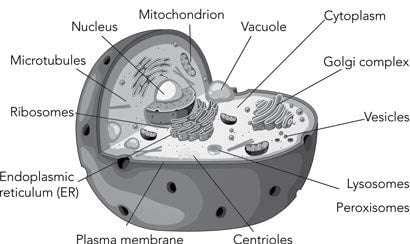Besteloverzicht
Mineralen en hun rol in de energieproductie van cellen
Waarom en wat als ze niet voldoende aanwezig zijn?
Mineralen zijn een van onze eerste levensbehoeften, ondanks dat ze niet duidelijk aanwezig zijn in onze voeding en we ons van de noodzaak ervan niet altijd bewust zijn. We denken eerder aan vitamines, vetten, eiwitten en koolhydraten.
We moeten ons realiseren dat we uit ongeveer 20 biljoen (2.000 miljoen) cellen bestaan die in oorsprong hetzelfde zijn als dat van een kleinplantje tussen de straattegels. De levensbehoeftevan dat plantje bestaat uit energie (zonlicht), luchtwater en mineralen. Dat geldt ook voor al onze cellen: licht, lucht, energie, water en bouwstoffen. Dat kleine plantje kan water en mineralen uit de grond halen, omdat de wortels daarbij geholpen worden door bacteriën en schimmels. Dat gebeurt ook in onze darmen, daar prepareren de bacteriënen schimmels ons voedsel tot bruikbare producten.
Omdat ons lichaam niet, zoals het plantje op straat, tussen de voedingstoffen staat, is het essentieel dat deze in ons voedsel aanwezig zijn. Als dat niet zo is, dan zal het lichaam – om te overleven – voedingstoffen uit andere delen van het lichaam halen.
De mensheid is steeds verder ontwikkeld, we kunnen gaan en staan waar we willen, zelf kiezen wat, wanneer en hoeveel we eten, maar tegelijk is dat ons probleem geworden. Ons eten heeft vaak niet genoeg voedingsstoffen, of verkeerde stoffen die de noodzakelijke stoffen ondermijnen.
De meest ondermijnende stoffen zijn suikers en koolhydraten, ze vernietigen de vitamines die de processen sturen in het lichaam. Ons lichaam is als een complexe stad waar het verkeer geleid moet worden, de vitamines zijn daar verantwoordelijk voor. Als we te veel suikers (ook veel aanwezig in alcohol) en makkelijk verbrandbare koolhydraten eten, hebben we te weinig vitamines en vinden de aansturingsprocessen niet goed plaats. We krijgen dan tekorten, functioneren op cel- en orgaan-niveau niet meer goed en krijgen diverse problemen.
Het belangrijkste dat een cel nodig heeft om te kunnen functioneren, is energie.
Ik benoemde het al eerder, maar in onze cellen wordt de energie geproduceerd door een klein organel, het mitochondrion (oorsprong: mito = draad, chondrion = korrel). Dit mitochondrion is afhankelijk voor zijn energieproductie van mineralen, dezelfde die dat kleine plantje gebruikt. Het is een universeel mechanisme.
Zonder energie geen actie, geen groei, geen afweer, geen leven. 1,5 miljard jaar geleden kregen cellen met een omhulde kern (eukaryoot) hun energie via een aantal processen waarbij kooldioxide gebruikt werd en licht, waarvoor geen zuurstof nodig was. Maar zuurstof was wél een product van deze reacties en begon zich op te bouwen in de atmosfeer.
Wetenschappers denken dat de eukaryoten in die tijd bacteriën (de mitochondriën) in zich opnamen die energie konden maken met zuurstof. Zo ontstond er in de loop van de miljoenen jaren die volgden een samenwerking (symbiose) tussen de eukaryoot en de mitochondriën, waardoor energie in de cellen kon worden geproduceerd met zuurstof. In alle dierlijke cellen vindt dit proces plaats, bij planten zijn er naast de mitochondriën ook nog chloroplast (bladgroenkorrels) aanwezig om energie te maken.
Anatomie dierlijke cel

In iedere cel van ons lichaam zitten minstens 200-500 mitochondriën en in sommige zeer actieve cellen zoals die van de hersenen en de lever wel 1000-2500, in een eicel 100.000.
Het draait dus in de cel om de energieproductie en als die er niet of te weinig is, dan kunnen cellen ook niet goed functioneren. In de mitochondriën zijn voor de productie van energie brandstoffen en zuurstof nodig, maar om deze goed te kunnen verbranden zijn mineralen en vitamines nodig.
Hans Beekmans
100% tevreden of geld terug
Als we op geen enkele manier aan uw verwachting voldoen, betalen we u volledig terug – inclusief verzendkosten
